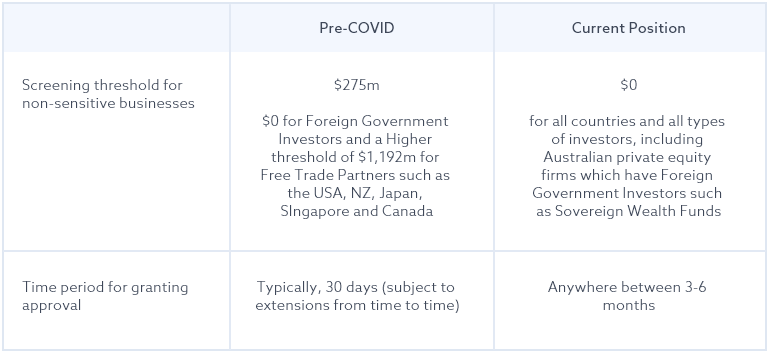The COVID-19 pandemic has caused a major shakeup to the foreign investment regime in Australia. To protect against opportunistic acquisitions of distressed Australian businesses by offshore buyers, the Australian government has:
- imposed a temporary zero-dollar Foreign Investment Review Board (FIRB) screening threshold for any foreign acquisition of an Australian business; and
- extended the statutory review period from 30 days to up to 6 months for all applications.
Additionally, amid rising geopolitical tensions, we expect to see a continuing trend of FIRB placing greater focus and scrutiny on national and data security.
These significant changes to FIRB have implications for both buyers and sellers in the current market. Many acquisitions of small to medium sized Australian businesses which previously did not require FIRB approval as they were below the $275m approval threshold (or the applicable higher threshold for Free Trade Partners) now require FIRB approval.
Any transaction involving a foreign buyer (or Australian subsidiary with upstream foreign investors) will require the sale to be conditional on obtaining FIRB approval.
Buyers
- Australian buyers have an advantage over foreign and offshore parties (including Australian subsidiaries) as they will not require FIRB approval, meaning the local buyer can offer a vendor greater transaction certainty and speed.
- Importantly, Australian private equity funds and institutional investors who have underlying foreign government investors (eg, sovereign wealth and pension fund investors), which applies to most mid to large Australian private equity firms, will also require FIRB approval for a transaction of any size.
- Australian buyers therefore may face less competition for quality Australian businesses in the near term as foreign buyers and Australian private equity firms with foreign government investors require FIRB approval, which may take up to 6 months under the temporary approval measures.
Sellers
- Sellers will need to take into account potential delays for FIRB if they wish to include foreign buyers or Australian private equity funds in their buyer pool. Acquisitions which previously did not require FIRB approval (eg, transactions below $275m) now require FIRB approval and the process can now take up to 6 months (as opposed to 30-45 days) given the backlog of FIRB applications as a result of the zero dollar threshold.
- For any seller contemplating a sale to a foreign buyer, it is imperative to ensure that the company has a robust framework in relation to:
- the collection, handling and storage of personal information;
- data security, including ensuring that data is stored securely on shore in Australia and not offshore (for example, on an offshore server which is often the case with platforms such as Dropbox and GoogleDrive).
COVID Changes to FIRB Regime
The blanket zero-dollar FIRB screening threshold was announced in late March 2020 as a temporary measure to protect against foreign buyers opportunistically acquiring Australian businesses which have been adversely affected by the economic impact caused by COVID-19.
The $0 threshold for FIRB approval would apply to all foreign buyers, irrespective of country of origin or whether they are a private foreign investor or a foreign government investor. Although the Australian government has yet to formally announce when these temporary measures will be lifted, it is expected to apply until at least 1 January 2021.

Focus on Data Security and Privacy
An emerging trend is greater scrutiny by FIRB in relation to data protection and privacy. FIRB is increasing its focus on any investment proposals which have the potential to:
- give foreign buyers access to personal data of Australian citizens; or
- involve the potential for transfer of personal information offshore.
As a consequence, for any business which has access to personal information of Australian individuals or businesses, we expect greater scrutiny from FIRB in respect of the nature, location and security of personal data. In the absence of national security concerns, it does not appear that FIRB intends to block transactions, however, FIRB may impose conditions on the approval which:
- restrict the storage of data to onshore Australian facilities;
- restrict the ability of certain data to be accessed from overseas, or by upstream investors or personnel;
- require service providers to have certain certifications and safeguards in place to protect data;
- require the acquirer to provide FIRB access to the data upon request;
- require businesses to maintain records of offshore access to data; and
- apply governance or physical access restrictions to support the above undertakings
Key Takeaways
1. The imposition of a temporary blanket zero dollar FIRB approval threshold means smaller transactions (ie, below $275m) now require FIRB approval if there is a foreign buyer. The resulting backlog of FIRB applications has led to lengthy delays to the FIRB approval process – what used to take 30-45 days pre COVID can now take 3 to 6 months.
2. Whilst the temporary $0 dollar threshold is in place, local buyers and investors are uniquely placed to acquire Australian businesses. Local buyers and investors may enjoy less competition from offshore buyers and be more attractive from a deal certainty and speed perspective – local buyers can sign on an unconditional basis and move quickly to complete the transaction.
3. We expect FIRB to have a greater focus on data security and privacy. Any seller who handles personal information of customers and is considering a sale to a foreign buyer who will require FIRB approval should ensure that they have a robust data and privacy framework, including data security measures and on-shoring of all data at Australian data centres or on-premise servers.







